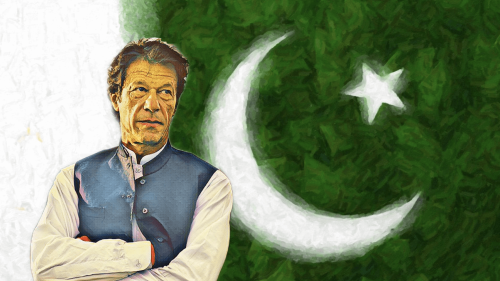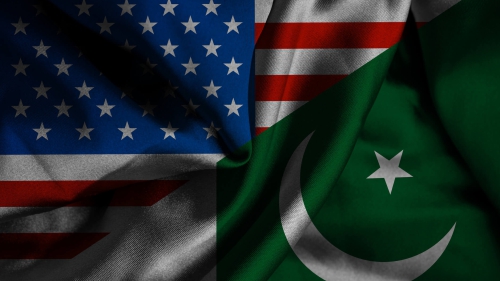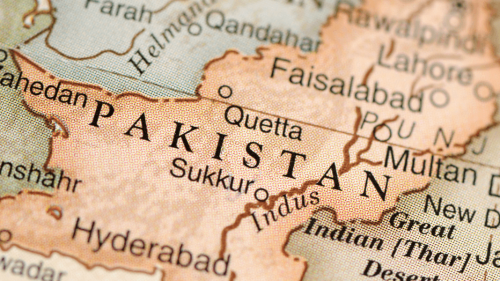Responsibility of Kashmiri Leadership
 |
I am obliged to share my views on the responsibility of Kashmiri leadership in charting the course to self-determination by peaceful methods in Kashmir. Parallel paths to a Kashmir resolution are underway. First, Pakistan and India have placed Kashmir on a negotiating agenda. The two rival nations have renounced inflexibility which have shipwrecked past endeavors like Tashkent, Simla and Lahore. The President of Pakistan has agreed to set aside the UN Security Council resolutions as long as the wishes of the Kashmiri people are the touchstone. The former Prime Minister of India, Mr. Vajpayee has acknowledged that the Constitution of India might be bent to accommodate a fair resolution of Kashmir. He is on recorded to have said that the resolution of Kashmir conflict could be within the parameters of Insaniat [humanity]. His successor, Dr. Manmohan Singh of the Congress Party, seems likely to pursue Mr. Vajpayee's policy with even greater vigor. He said on May 19, 2004 that his government would seek "most friendly" relations with its neighbors, especially Pakistan. Dr. Singh, replying to a question at a press conference, said taking the peace process with Pakistan further would be a priority for his government. "We must find all possible ways to resolve all outstanding conflicts with Pakistan. It is our sincere hope that all these conflicts between us become a thing of the past," he remarked.
Responding to another question on whether the new government would carry forward the dialogue with the Hurriyet, initiated by the Vajpayee government, Dr Singh said discussions would continue with all the parties to bring permanent peace to Jammu and Kashmir. "As far as the J[ammu] and K[ashmir] policy is concerned, our party is in favor of discussion with all interested groups. We will explore all possible opportunities to bring peace and prosperity to this vital state of the nation," Dr Singh said.
The talks between the Government of India and the Kashmiri leadership need to be all inclusive. Besides, Hurriyet (A), leaders like Syed Ali Geelani, Mohammad Yasin Malik, Shabir Ahmed Shah, Sheikh Abdul Aziz and even Hizbul Mujahideen need to be included in the peace process. The process has to be defined to be for the final resolution of the Kashmir conflict.
Complementing the India-Pakistan, India-Kashmir tracks are international pressures for a Kashmiri settlement.
The United States, the United Nations, and most of the world eagerly hope for a resolution as a pivotal step towards non-proliferation in South Asia. Neither India nor Pakistan will be candidates for ratifying nuclear non-proliferation or missile non-proliferation treaties unless Kashmir is resolved. And until that happy day arrives, Kashmir will remain the most dangerous nuclear hotspot on the planet.
Since 9/11, counterterrorism has been placed, by the United States, the United Nations, the European Union, and the overwhelming majority of other nations, as an urgent priority. Accordingly, international voices support a prompt Kashmir resolution as a counterterrorism measure.
At this guardedly propitious time, the role of Kashmiri leadership is pivotal and its responsibilities are correspondingly great. Leaders are essential to political change and direction. An acephalous collection of people, no matter how well intended, have never achieved anything politically significant. Leaders have invariably been in the vanguard to lead and to guide. In other words, Kashmiri leaders cannot blithely assume that progress towards self-determination will come spontaneously from the people without their advice, example, and sacrifices. Kashmiri leaders cannot be summer soldiers or sunshine patriots. History will hold them accountable for success or failure.
Their responsibilities are manifold. First is to teach and practice the adage that if we do not hang together, we will all hang separately. Kashmiri leaders thus must subordinate individual quests for political power, prominence, and other gain to the common good of all Kashmiris.
In addition, what matters is not who obtains public credit for success, but that success is achieved. Petty jealousies have no place among Kashmir's leadership circle. All should accept un-reluctantly personal sacrifices necessitated by the urgency of the Kashmir issue. Emulation by the Kashmiri people will follow, and generate the dynamics indispensable for the inevitably arduous struggle for self-determination.
The North Star for Kashmiri leaders must be the feasible, not the utopian. The world is unsentimental. On the international stage, might is customarily more powerful than right. National interests ordinarily trump intellectual consistency, international law, and professed universal standards of justice. But there are exceptions, such as East Timor or Namibia. Moral suasion occasionally exhibits teeth. Kashmiri leaders must be skillful in orchestrating the complex array of cynical and high-minded motives of nations to achieve a symphony playing the lofty theme of self-determination for Kashmiris. Such orchestration will be more an art than a science, and will require sleepless labors and lucubrations to succeed. It is not a task for the indolent or dull.
In approaching a Kashmir resolution, Kashmir's leadership should not sacrifice the good on the altar of the perfect. The leadership should display flexibility in methods for honoring the wishes of the Kashmiri people. Pragmatism should also be displayed with regard to procedures and mechanisms for honoring the fundamental rights of minorities and weaker segments of our society. The sole non-negotiable issue should be respecting the consensus of the people of Kashmir with whom sovereignty resides.
In sum, charity, statesmanship, self-effacement, perseverance, and prescience should be earmarks of the Kashmiri leadership. A standard must be set to which the wise and honest may repair. We must neither stumble nor waver in the task of attaining self-determination for millions groaning under repression and grim privation.
Dr. Ghulam Nabi Fai is executive director of the Kashmir American Council. He can be reached at [email protected]
Related Suggestions
Well written article. I hope that positve peace comes to this long suffering region. I also pray that diaspora Pakistani, Kashmiris, and Indians would not hold silly agitative demonstrations when peace nearer in far away areas like UK, America, etc....I can understand their hearts in desi lands but if really serious in making a fuss should go live in occupied Kashmir.
I can only pray the killing, rapes, humiliations, and murders other athrocities against innocents decreases there.
Wassalam.

















